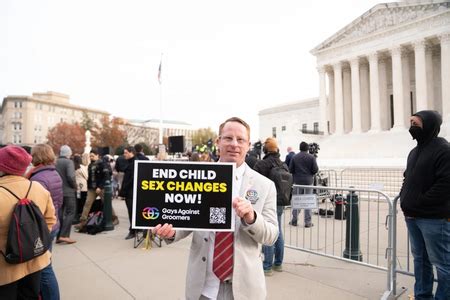
A young woman who detransitioned after undergoing gender transition as a teenager is applauding the Supreme Court’s decision to allow states to restrict gender-affirming care for minors, arguing such interventions can have irreversible and detrimental consequences.
Chloe Cole, now 19, has become a prominent voice in the debate surrounding transgender healthcare, sharing her personal experiences and advocating for caution when considering medical interventions for young people experiencing gender dysphoria. Cole underwent a double mastectomy, took testosterone, and had her uterus removed between the ages of 13 and 17 before ultimately detransitioning. She now contends that she was too young to make such life-altering decisions and that the medical professionals involved did not adequately address her underlying mental health issues.
“I am grateful that the Supreme Court is allowing states to protect children from these harmful procedures,” Cole stated. “I believe that these interventions are causing irreparable harm to young people who are not old enough to fully understand the consequences.”
Cole’s case is part of a larger national conversation regarding the appropriateness of gender-affirming care for minors, with numerous states enacting legislation to restrict or ban certain procedures. These laws have faced legal challenges, leading to the Supreme Court’s involvement.
The Supreme Court’s decision does not directly rule on the constitutionality of these laws but allows them to remain in effect while lower courts consider their legality. This decision has been met with both praise and criticism, highlighting the deeply divisive nature of the issue.
Cole’s Transition and Detransition
Chloe Cole began identifying as male at the age of 12 and started taking puberty blockers at 13. She subsequently began taking testosterone and underwent a double mastectomy at 15. These procedures were part of her gender transition process, aimed at aligning her physical appearance with her gender identity.
However, as she approached her late teens, Cole began to question her transition. She experienced feelings of regret and realized that she had not fully explored the underlying reasons for her gender dysphoria. At 17, she decided to detransition, halting hormone therapy and seeking medical care to reverse some of the physical changes she had undergone.
Cole has been vocal about the challenges she has faced during her detransition process, both physically and emotionally. She has spoken extensively about the long-term health consequences of the medical interventions she received, including the loss of bone density and potential fertility issues. She also emphasizes the emotional toll of detransitioning, which involves grappling with feelings of regret, confusion, and loss.
Arguments Against Gender-Affirming Care for Minors
Cole’s arguments against gender-affirming care for minors center on the idea that young people are not capable of making informed decisions about irreversible medical procedures. She believes that children and adolescents experiencing gender dysphoria should receive comprehensive mental health support to explore the underlying causes of their feelings before considering medical interventions.
She also raises concerns about the potential long-term health consequences of puberty blockers, hormone therapy, and surgeries. While proponents of gender-affirming care argue that these interventions are safe and effective when administered under appropriate medical supervision, Cole points to the lack of long-term studies on the effects of these treatments on young people.
Furthermore, Cole argues that there is a growing trend of young people detransitioning after undergoing gender transition as teenagers. She suggests that this trend indicates that some young people may be transitioning without fully understanding the implications of their decisions. Detransitioners like Cole are now becoming increasingly visible in public discourse, adding a crucial perspective to the debate that was, for years, dominated by voices advocating for affirmative care.
The Broader Debate on Gender-Affirming Care
The debate surrounding gender-affirming care for minors is complex and multifaceted. On one side are those who advocate for allowing young people to access medical interventions that align with their gender identity, arguing that these interventions can improve mental health and overall well-being. They emphasize the importance of listening to transgender youth and respecting their autonomy.
Proponents of gender-affirming care often cite guidelines from medical organizations such as the American Academy of Pediatrics and the World Professional Association for Transgender Health (WPATH), which support the use of puberty blockers, hormone therapy, and surgery in certain cases. They argue that these interventions are evidence-based and can be life-saving for transgender youth who are experiencing significant distress.
On the other side are those who advocate for caution when considering medical interventions for young people experiencing gender dysphoria. They raise concerns about the potential long-term health consequences of these interventions and argue that young people may not be able to fully understand the implications of their decisions. They also emphasize the importance of exploring the underlying causes of gender dysphoria before considering medical interventions.
Opponents of gender-affirming care often point to the lack of long-term studies on the effects of these treatments on young people and argue that more research is needed to fully understand the risks and benefits. They also raise concerns about the potential for social contagion, suggesting that some young people may be influenced by their peers or online communities to identify as transgender.
The Role of the Supreme Court
The Supreme Court’s decision to allow states to restrict gender-affirming care for minors reflects the deeply divisive nature of the issue. The court’s decision does not establish a legal precedent but allows state laws to remain in effect while lower courts consider their constitutionality.
This decision has been praised by those who advocate for caution when considering medical interventions for young people experiencing gender dysphoria. They argue that the Supreme Court’s decision allows states to protect children from potentially harmful procedures.
However, the decision has been criticized by those who advocate for allowing young people to access gender-affirming care. They argue that the Supreme Court’s decision undermines the rights of transgender youth and their families to make informed decisions about their healthcare. They also argue that the decision will have a chilling effect on access to care for transgender youth in states that have enacted restrictions.
The Supreme Court’s decision is likely to have a significant impact on the landscape of transgender healthcare in the United States. It is expected that more states will enact legislation to restrict or ban gender-affirming care for minors. These laws will likely face legal challenges, leading to further court decisions on the issue.
The Future of Transgender Healthcare
The future of transgender healthcare in the United States is uncertain. The debate surrounding gender-affirming care for minors is likely to continue, with both sides advocating for their positions. The courts will play a key role in shaping the legal landscape of transgender healthcare.
It is important to approach this issue with sensitivity and respect for all perspectives. Transgender youth deserve access to comprehensive healthcare that meets their individual needs. At the same time, it is important to ensure that young people are able to make informed decisions about their healthcare and that they are protected from potentially harmful procedures. The conversation needs to incorporate the growing voices of detransitioners who can share their unique and often unheard perspectives.
The ongoing discussions surrounding gender-affirming care require careful consideration of medical ethics, legal rights, and the well-being of all individuals involved. By fostering open dialogue and promoting evidence-based policies, a more informed and compassionate approach to transgender healthcare can be achieved. The impact of the Supreme Court’s decision is likely to reverberate through communities and healthcare systems nationwide, highlighting the urgent need for clarity and understanding in this evolving field.
Frequently Asked Questions (FAQ)
1. What is gender-affirming care?
Gender-affirming care encompasses a range of medical, psychological, and social interventions designed to support individuals whose gender identity differs from the sex they were assigned at birth. For minors, this can include puberty blockers, hormone therapy, and, in some cases, surgeries. Psychological support and counseling are also integral components of gender-affirming care, aimed at addressing mental health and overall well-being. The goal is to help individuals align their physical appearance and social identity with their gender identity, thus alleviating distress associated with gender dysphoria.
2. What is detransitioning, and why do people detransition?
Detransitioning refers to the process of discontinuing or reversing gender transition interventions, such as hormone therapy or surgeries. Individuals may choose to detransition for various reasons, including regret, changes in gender identity, or challenges adapting to life as a different gender. External factors, such as social pressure or discrimination, and concerns about the long-term health effects of transition-related treatments, can also influence the decision to detransition. Detransitioning is not always a straightforward process, and it can involve medical, psychological, and social adjustments.
3. What are the arguments for and against gender-affirming care for minors?
Arguments in favor of gender-affirming care for minors emphasize the importance of providing support and medical interventions that can improve mental health and overall well-being. Proponents argue that denying access to gender-affirming care can lead to increased rates of depression, anxiety, and suicidal ideation among transgender youth. They cite guidelines from medical organizations that support gender-affirming care when administered under appropriate medical supervision.
Arguments against gender-affirming care for minors raise concerns about the potential long-term health consequences of medical interventions and argue that young people may not be able to fully understand the implications of their decisions. Opponents also point to the lack of long-term studies on the effects of these treatments on young people and suggest that more research is needed to fully understand the risks and benefits. They argue for a more cautious approach, emphasizing the importance of mental health support and counseling before considering medical interventions.
4. What are the potential long-term effects of puberty blockers and hormone therapy?
Puberty blockers and hormone therapy can have various long-term effects, both physical and psychological. Puberty blockers can affect bone density and fertility, while hormone therapy can lead to changes in cardiovascular health, liver function, and reproductive function. The long-term effects of these treatments are still being studied, and more research is needed to fully understand the risks and benefits. It is essential for individuals considering these interventions to discuss the potential long-term effects with their healthcare providers.
5. How does the Supreme Court’s decision impact transgender youth and their families?
The Supreme Court’s decision to allow states to restrict gender-affirming care for minors has significant implications for transgender youth and their families. In states with restrictions, transgender youth may face limited access to medical care and may need to travel to other states to receive treatment. This can create financial and logistical challenges for families. The decision also raises concerns about the potential for discrimination and the erosion of transgender rights. Supporters of transgender rights argue that the decision undermines the rights of transgender youth to make informed decisions about their healthcare and access necessary medical care. The ruling may also affect mental health among transgender youth due to increased stress and fear of losing access to medical interventions.
Expanded Analysis and Background Information
The debate surrounding gender-affirming care for minors is not new but has intensified in recent years as more young people identify as transgender and seek medical interventions. This has led to a surge in legislative efforts to restrict or ban gender-affirming care, creating a patchwork of laws across the United States. The Supreme Court’s decision adds another layer of complexity to this already fraught landscape.
Historical Context
The history of transgender healthcare dates back to the early 20th century, with the first gender affirmation surgeries taking place in the 1950s. However, it was not until the late 20th and early 21st centuries that transgender issues gained greater visibility and acceptance in mainstream society. As awareness of transgender identities grew, so did the demand for gender-affirming care.
Medical organizations began developing guidelines for the treatment of gender dysphoria, including the use of puberty blockers, hormone therapy, and surgery. These guidelines were based on the best available evidence at the time and were designed to provide a framework for ethical and effective care.
However, as gender-affirming care became more widely available, it also faced increasing scrutiny and criticism. Some individuals and groups raised concerns about the potential risks and harms of medical interventions, particularly for young people. This led to a backlash against gender-affirming care and efforts to restrict or ban it.
Legal and Political Developments
The legal and political landscape of transgender healthcare has been rapidly evolving in recent years. Numerous states have enacted laws that restrict or ban gender-affirming care for minors, citing concerns about the potential long-term health consequences and the ability of young people to make informed decisions.
These laws typically target puberty blockers, hormone therapy, and surgeries, but some also restrict access to other forms of gender-affirming care, such as mental health counseling. They often include provisions that allow healthcare providers to refuse to provide gender-affirming care based on religious or moral objections.
The legality of these laws has been challenged in court, with mixed results. Some courts have upheld the laws, while others have struck them down as unconstitutional. The Supreme Court’s decision to allow states to restrict gender-affirming care for minors adds further uncertainty to the legal landscape.
Ethical Considerations
The debate surrounding gender-affirming care for minors raises a number of ethical considerations. These include the principles of autonomy, beneficence, non-maleficence, and justice.
- Autonomy refers to the right of individuals to make their own decisions about their healthcare. Proponents of gender-affirming care argue that transgender youth have the right to make informed decisions about their medical treatment, including whether or not to undergo gender-affirming care.
- Beneficence refers to the obligation to do good and promote the well-being of patients. Proponents of gender-affirming care argue that providing transgender youth with access to gender-affirming care can improve their mental health and overall well-being.
- Non-maleficence refers to the obligation to do no harm. Opponents of gender-affirming care argue that medical interventions can have potential risks and harms, particularly for young people, and that it is important to minimize these risks.
- Justice refers to the principle of fairness and equal access to healthcare. Advocates argue that all individuals, including transgender youth, should have equal access to healthcare services, including gender-affirming care.
Balancing these ethical considerations is complex and requires careful consideration of the individual circumstances of each case.
The Role of Medical Organizations
Medical organizations, such as the American Academy of Pediatrics and the World Professional Association for Transgender Health (WPATH), have played a significant role in shaping the debate surrounding gender-affirming care for minors. These organizations have developed guidelines for the treatment of gender dysphoria that support the use of puberty blockers, hormone therapy, and surgery in certain cases.
However, these guidelines have also faced criticism from some individuals and groups who argue that they are not based on sufficient evidence and that they promote the medicalization of transgender identities. Some critics advocate for a more cautious approach to gender-affirming care, emphasizing the importance of mental health support and counseling before considering medical interventions.
The Impact on Mental Health
The mental health of transgender youth is a critical consideration in the debate surrounding gender-affirming care. Studies have shown that transgender youth are at higher risk for depression, anxiety, and suicidal ideation compared to their cisgender peers.
Proponents of gender-affirming care argue that providing transgender youth with access to gender-affirming care can improve their mental health and reduce the risk of suicide. They cite studies that have shown that gender-affirming care can lead to significant improvements in mental health outcomes.
Opponents of gender-affirming care argue that the mental health benefits of these interventions may be overstated and that other factors, such as social support and acceptance, may be more important. They also raise concerns that medical interventions may not address the underlying causes of mental health issues and that they may lead to long-term psychological problems.
The Voices of Detransitioners
The voices of detransitioners, such as Chloe Cole, are becoming increasingly important in the debate surrounding gender-affirming care. Detransitioners can provide valuable insights into the experiences of individuals who have undergone gender transition and then chosen to detransition.
Detransitioners often speak about the challenges they faced during their transition and detransition processes, both physically and emotionally. They can also offer perspectives on the factors that influenced their decisions to transition and detransition.
Their stories can help to inform the debate surrounding gender-affirming care and to promote a more nuanced understanding of the complexities of gender identity and transition.
The Importance of Research
More research is needed to fully understand the long-term effects of gender-affirming care on young people. This research should focus on the physical and psychological outcomes of puberty blockers, hormone therapy, and surgery, as well as the factors that contribute to successful transitions and detransitions.
Research should also explore the underlying causes of gender dysphoria and the effectiveness of different approaches to treatment. This research should be conducted in a rigorous and ethical manner, with the participation of transgender individuals and communities.
By conducting more research, a more informed and evidence-based approach to transgender healthcare can be developed.
The Need for Compassion and Understanding
The debate surrounding gender-affirming care for minors is often highly polarized and emotionally charged. It is important to approach this issue with compassion and understanding, recognizing that there are diverse perspectives and experiences.
All individuals, including transgender youth, deserve to be treated with respect and dignity. Their voices should be heard, and their concerns should be addressed. By fostering open dialogue and promoting empathy, a more constructive and compassionate approach to transgender healthcare can be achieved.
Moving Forward
The future of transgender healthcare in the United States will depend on the ongoing legal and political developments, as well as the evolving understanding of gender identity and transition. It is essential to continue to engage in open and respectful dialogue, to promote evidence-based policies, and to ensure that all individuals have access to the healthcare they need. The discussion needs to expand to include the voices of detransitioners, whose experiences are critical to informing a comprehensive understanding of the complexities involved in gender-affirming care and its potential long-term consequences.









